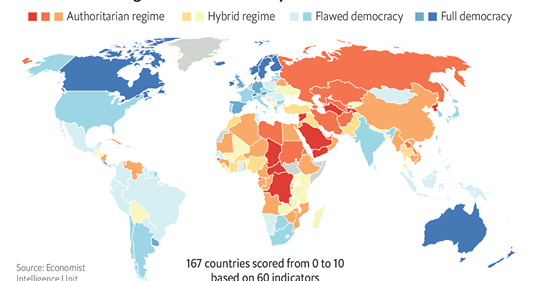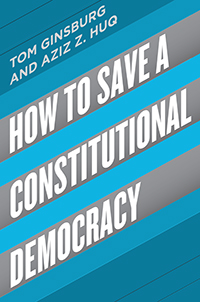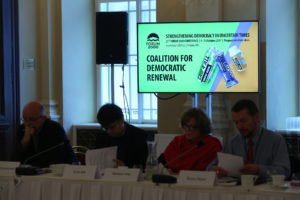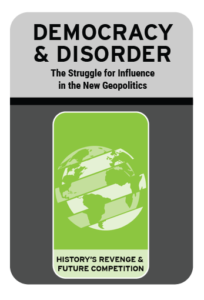
Economist Intelligence Unit’s Democracy Index FB
Although it is true that more of the world is democratic than ever before, there are signs that progress may soon come to a halt, notes Erica Frantz, an assistant professor in political science at Michigan State University. Democracies are gravitating toward authoritarianism in a number of surprising places, she writes for Foreign Policy:
At this point, we can only speculate as to why this is happening now. Likely causes include citizen disillusionment on the heels of the migration crisis, rising inequality, and stagnating standards of living. Regardless, although we have traditionally viewed the developed world as immune to this sort of thing—especially democratic backsliding evolving into full democratic breakdown—we no longer can. Meanwhile, today’s authoritarian regimes are making it more difficult to brand them as such. They are increasingly mimicking the traits of democracy, in ways that seem liberal but actually work to extend the authoritarian lifespan.
 As nativism, populism, and authoritarianism rise around the world, and as institutions that protect liberties are buffeted by attacks, can democracy endure? Johns Hopkins University asks.
As nativism, populism, and authoritarianism rise around the world, and as institutions that protect liberties are buffeted by attacks, can democracy endure? Johns Hopkins University asks.
Drawing on a rich array of examples of democratic backsliding, Tom Ginsburg and Aziz Z. Huq show In How to Save a Constitutional Democracy demonstrate that constitutional rules can either hinder or hasten the decline of democratic institutions. The authors distinguish between a fast and a slow track away from liberal democratic constitutionalism, notes analyst Dieter Grimm:
- The fast track, called “democratic collapse“, leads to more or less authoritarian systems of government, and it does so in a rather brief period of time. It usually happens by way of using emergency powers or by a military coup. The transition from the Weimar Republic to National Socialism stands for this track. In the authors’ view, however, it is „yesterday’s instrument against democracy”. Nowadays, there are more subtle means to transform a system.
- The slow track is called “democratic erosion“ and comes in two forms, either through a take-over by a charismatic populist leader or by “partisan degradation“, either because of a failure of a whole party system or by an electoral success of one party, which makes it invulnerable to rotation.

21st Forum 2000 Conference
One can see that the basic pattern repeats itself more or less in different countries, Grimm adds, noting that the authors identify a tool kit that consists of constitutional amendments, the elimination of institutional checks on the majority, centralizing executive power, shrinking the public sphere and eliminating competition.
The European Commission has backed French President Emmanuel Macron’s call for democratic renewal through better protection of EU freedoms and democracy, noting many of his ideas were already in place or under way.
“On a European renaissance, France and the Commission are on the same wavelength,” it stated. “We are fighting the same fight,”
Venezuela’s democratic renewal will require the restoration of press freedoms which have been systematically destroyed by the regime, ending state control of media and censorship, AS/COA’s Eric Farnsworth told the U.S. Senate Foreign Relations Committee.
Liberal democracy also faces external threats arising from the resurgence of authoritarian revisionist powers, observers suggest.
 China’s growth and determined illiberalism mean that open societies around the world must prepare for the current era of democratic stagnation to continue, or even worsen, notes Tarun Chhabra, a fellow with Brookings’ Foreign PolicyProject on International Order and Strategy. Against this backdrop, the United States and its allies must first come to grips with the gravity of the China challenge and then advance democracy and liberal values to the forefront of U.S. grand strategy, he contends.
China’s growth and determined illiberalism mean that open societies around the world must prepare for the current era of democratic stagnation to continue, or even worsen, notes Tarun Chhabra, a fellow with Brookings’ Foreign PolicyProject on International Order and Strategy. Against this backdrop, the United States and its allies must first come to grips with the gravity of the China challenge and then advance democracy and liberal values to the forefront of U.S. grand strategy, he contends.
“U.S. and allied leaders of open societies should embrace the China challenge,” he adds, “seizing an opportunity to restore faith in democratic capitalism through political realignments and mobilization for renewal, including major new investments in infrastructure, research and development, education, development assistance, intelligence, alliances, and defense.”
 Reawakening the Spirit of Democracy
Reawakening the Spirit of Democracy
Long established international alliances are fraying. Institutions that protect and promote our liberties are being buffeted by attacks from the left and right. These trends have led many to ask: Can liberal democracy endure? JHU asks.
“Reawakening the Spirit of Democracy” will address this question head-on. Co-hosted by the Stavros Niarchos Foundation Agora Institute at Johns Hopkins and the Renew Democracy Initiative, this conference will convene a diverse group of thought leaders [including several associates of the National Endowment for Democracy] who will examine and wrestle with the underlying threats to liberal democracy and propose strategies to reinvigorate it.
Conference participants include:
- Yamiche Alcindor, Correspondent, PBS NewsHour
- Anne Applebaum, Washington Post columnist and Professor of Practice, London School of Economics
- Sheri Berman, Professor of Political Science, Barnard College, Columbia University
- Max Boot, Jeane J. Kirkpatrick Senior Fellow for National Security Studies, Council on Foreign Relations
- Eric Cantor, former United States Representative, Virginia
- Ben Cardin, United States Senator, Maryland
- Eliot Cohen, Executive Vice Dean, Johns Hopkins University
- Ronald J Daniels, President, Johns Hopkins University
- Evelyn Farkas, Resident Senior Fellow, German Marshall Fund, Founding Partner Scarlet Oak Advisors
- Michèle Fluornoy, Co-Founder and Managing Director, WestExec Advisors
- Bill Galston, Ezra K. Zilkha Chair and Senior Fellow, Brookings Institution
- Karl Theodor zu Guttenberg, Chairman, Spitzberg Partners
- Jonathan Haidt, Thomas Cooley Professor of Ethical Leadership, New York University Stern School of Business
- Heidi Heitkamp, former United States Senator, North Dakota
- Toomas Hendrik Ilves, former President of Estonia and Berggruen Fellow at Center for Advanced Studies, Stanford University
- Garry Kasparov, Chairman, Renew Democracy Initiative
- Bill Kristol, Founding Director, Defending Democracy Together
- Mark Lasswell, Associate Op-Ed Editor, Washington Post
- Edward Lucas, Senior Vice-President, Center for European Policy Analysis
- Barbara Mikulski, former United States Senator, Maryland
- Yascha Mounk, Associate Professor SAIS Johns Hopkins and SNF Agora Institute
- Jennifer Rubin, Opinion Writer, Washington Post
- Christopher Steele, former British Intelligence Officer
- Bret Stephens, New York Times Columnist
- Pete Wehner, Senior Fellow, Ethics and Public Policy Center; Contributing Opinion Writer, New York Times
March 13, 2019 – March 14, 2019
A conference co-hosted by Renew Democracy Initiative and SNF Agora Institute at Johns Hopkins. March 13: Evening Event – Canadian Embassy, Washington, DC
March 14: All Day – Peabody Library, Baltimore MD (Open to Public)







